|
|
|
Sort Order |
|
|
|
Items / Page
|
|
|
|
|
|
|
| Srl | Item |
| 1 |
ID:
158293
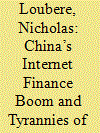

|
|
|
|
|
| Summary/Abstract |
One of the main drivers of China’s e-commerce boom is the dramatic expansion of the country’s Internet finance industry, which has grown and diversified at a staggering rate over the past decade. The emergence of Chinese Internet finance has been discussed in largely positive terms as facilitating commercial activity. It has also been linked to the wider developmental goal of promoting financial inclusion through the provision of financial services to previously excluded populations. Emerging from the global microfinance movement, the concept of financial inclusion depicts increased access to financial services (particularly credit) as an inherently beneficial means of empowering the poor and driving bottom-up economic development. This article challenges this dominant narrative of beneficial digital financial inclusion in China. It draws on the growing body of literature critiquing the global financial inclusion movement, and examines examples of exploitation, fraud, instability, and extraction related to expanded digital financial coverage in contemporary China. It then demonstrates that digital financial inclusion is part and parcel of the Chinese government’s plans to create a social credit system in an attempt to construct a “trustworthy society.” In this way, digital financial inclusion can be seen as a key element in a wider project of expanding surveillance through big data in order to close down spaces for those seeking to contest the hegemonic socioeconomic order. The article argues that these examples illuminate fundamental processes implicit in the expansion of the commercial Internet finance industry. In this way, while the extension of digital financial inclusion in China benefits certain groups, it also necessarily serves to reproduce patterns of inequality and exploitation.
|
|
|
|
|
|
|
|
|
|
|
|
|
|
|
|
| 2 |
ID:
097212
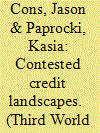

|
|
|
| 3 |
ID:
167015
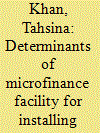

|
|
|
|
|
| Summary/Abstract |
Access to electricity in rural areas of the developing parts of the world is yet to reach a minimum satisfactory level. Bangladesh is no different, and hence widespread dissemination of solar home system (SHS) is a suitable vehicle to ensure greater access to electricity in remote rural areas of the country. A substantial portion of four million installed SHSs in Bangladesh has availed microcredit provided by various microfinance institutions. However, what determines the users' preference towards microcredit in installing SHS on the rooftop is yet to be answered. This research aims at analyzing the determinants of microfinance for installing SHS in rural Bangladesh. This research employed binary logistic regression to analyze the factors that affect selection of different mode of purchase: upfront payment or installment purchase. It identified a set of independent variables based on existing literature in order to investigate their influence on households’ choice between cash payment and installment purchase. The research found that more than 63% of the rural households in the study areas used SHS financed through microcredit. Level of education, location, family size and occupation affects choice of purchase mode. Logistic regression analysis showed that age, location and size of SHS affect the likelihoods of choosing upfront payment or installment purchase.
|
|
|
|
|
|
|
|
|
|
|
|
|
|
|
|
| 4 |
ID:
115249
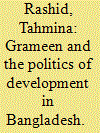

|
|
|
|
|
| Publication |
2012.
|
| Summary/Abstract |
Bangladesh is one of the countries with a thriving political culture, vibrant civil society and a huge development sector, yet struggling with the issues of persisting poverty as a substantial majority still lives below the poverty line. The development sector has largely maintained an apolitical posture focusing on expanding their outreach, commercial enterprises and access to donor assistance. As a consequence of new economic realities and dynamics of financial markets at local and global level, the sector is increasingly being pushed to expand its influence in the local power structures, thus shifting the nature of their relationship-from a non-engaged to an actively engaged relationship with the state. This article would argue that the increasing commercial/entrepreneurial activities are reshaping the development sector in Bangladesh, even overhauling the dynamics of the socio-economic and political scene. As these not-for-profit organisations are entering into a state-regulated sector, in which other actors (business houses) are already operating, lobbying to protect similar commercial interests, there are contestations around regulatory regimes and political agency in policy-making arenas. Recent controversy around Yunus's role in the Grameen Bank is indicative of the shifting nature of developmental politics.
|
|
|
|
|
|
|
|
|
|
|
|
|
|
|
|
| 5 |
ID:
172218
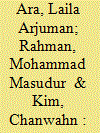

|
|
|
|
|
| Summary/Abstract |
This article investigates the economic impact of continuing borrowers’ participation in the microcredit programme on poverty eradication in Bangladesh. A panel data set was collected through a field survey for the years 2013–2016 to identify the impact of a microcredit programme on continuous participation borrowers. The propensity score matching (PSM) method is used to eliminate selection bias and the difference-in-difference (DID) model is applied for the empirical analysis. The findings of the study demonstrate that more benefits are realized from continued participants compared to discontinued participants.
|
|
|
|
|
|
|
|
|
|
|
|
|
|
|
|
| 6 |
ID:
107483
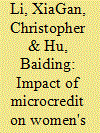

|
|
|
|
|
| Publication |
2011.
|
| Summary/Abstract |
The impact of microcredit on women's empowerment remains controversial, as documented in the microfinance literature. While some studies claim that microcredit helps women increase their income earning abilities, leading to greater power to overcome cultural asymmetries, others contend that small loans allocated to women are usually controlled by their spouses, which results in more severe subordination of women and leaves them more vulnerable to the patriarchy system within the household and/or at society level. This paper evaluates the empowerment impact of microcredit on rural women in China. Logistic regression is employed for empirical analysis and data are collected through a rural household survey. The results confirm that microcredit has a significant impact on five dimensions of women's empowerment, ranging from economic security to awareness of social/legal issues.
|
|
|
|
|
|
|
|
|
|
|
|
|
|
|
|
| 7 |
ID:
101156
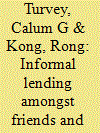

|
|
|
|
|
| Publication |
2010.
|
| Summary/Abstract |
This paper explores the relationship between informal and formal lending in China with consideration of how the strength of informal lending might affect microcredit. Lending relationships involving trust are investigated using original survey data from over 1500 farm households. Econometric results confirm a relationship between trust and informal lending, and mistrust and formal lending. With over 67% of farm households borrowing from friends and relatives the economic significance between this form of informal lending and borrowing from Rural Credit Cooperatives and Micro Finance Institutions cannot be overlooked.
|
|
|
|
|
|
|
|
|
|
|
|
|
|
|
|
| 8 |
ID:
127079
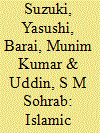

|
|
|
|
|
| Publication |
2013.
|
| Summary/Abstract |
With diverse histories and attitudes toward risk-taking, different financial systems have a common aim: ensuring financial stability and efficiency within a geographical region. But differences exist between various financial systems as a result of their evolution and adaptation to their surrounding environment. This paper aims to analyze the incentive and sanction mechanisms of the Islamic mode of banking and the Grameen Bank model of microcredit in Bangladesh, and how they help ensure their financial stability and efficiency. We challenge the conventional explanations of their success. We point out that the informal sanction mechanisms embedded in the two modes of financial intermediation - avoiding non-compliance with Islamic Shari'ah (revealed divine law) in the case of Islamic banking, and kinship-based groupings or gushtis in the case of microcredit - play important roles in lowering the transaction costs of screening and enforcing contracts. We also point out how bank rent opportunity - the promised return from non-participatory financing and a high spread supported through low-cost funds provided by donor agencies and compulsory savings - is captured in each of the two modes, playing a further important role in maintaining their franchise values, given the specificities of the Bangladeshi financial context.
|
|
|
|
|
|
|
|
|
|
|
|
|
|
|
|
| 9 |
ID:
130729
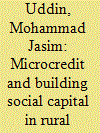

|
|
|
|
|
| Publication |
2014.
|
| Summary/Abstract |
In the 1990s, social capital and the group-based microcredit programme emerged as major planks of developmental interventions, and both approaches have underscored the necessity to mobilize social factors in the alleviation of poverty and social solidarity. The group-based microcredit model is considered an effective policy instrument for increasing women's access to financial capital and for strengthening their social capital at the local level. This study contributes to the continuing debate over how or if group-based microcredit facilitates to the formation of social capital at the local level in Bangladesh. Case studies and ethnographic (in-depth) interviews of 151 women microcredit borrowers of the Grameen Bank and the Bangladesh Rural Advancement Committee of Bangladesh were used in this study. The study suggests that the relationship between participation in the group-based microcredit programme and the facilitation of social capital at the local level is at best ambiguous. The assumed association between microcredit membership and building social capital (social networks, norms of reciprocity and collective identity and action) is much less prominent than commonly suggested by many previous scholars and development practitioners.
|
|
|
|
|
|
|
|
|
|
|
|
|
|
|
|
| 10 |
ID:
101499
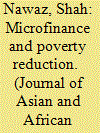

|
|
|
|
|
| Publication |
2010.
|
| Summary/Abstract |
To evaluate the competing claims on the impact of microfinance programs on multidimensional poverty, a village study in Bangladesh was conducted where three microfinance programs had been operating for more than five years. The study found that microfinance has resulted in a moderate reduction in the poverty of borrowers, as measured by a variety of socio-economic indicators, but has not reached many of the poorest in the village. To make microfinance a more effective means of poverty reduction other services such as skills training, technological support, education and health related strategies should be included with microfinance.
|
|
|
|
|
|
|
|
|
|
|
|
|
|
|
|
| 11 |
ID:
103878
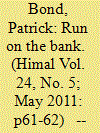

|
|
|
| 12 |
ID:
163741
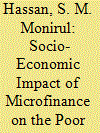

|
|
|
|
|
| Summary/Abstract |
Microfinance is considered to be the panacea for eradicating poverty from third-world society and this claim by non-government organizations (NGOs) is not unfounded. Evidence from Bangladesh reveals a partial success with respect to this viewpoint. Bangladesh is a poverty-ridden country; however, poor people in rural Bangladesh have shown significant material gains with regard to their lifestyles and it is no longer the case that they only have the bare minimum of food. Despite this significant improvement, it is still confusing as to whether these people have managed to cross the poverty line or not. Data show that poor people never stop borrowing money from the NGOs. The cycle of taking and retaking has made them dependent rather than independent agents in their society. With this viewpoint under consideration, this article seeks to explain the chronological sequence of events involved in taking credit. The ontological position of this study is interpretative in nature and such a position has allowed us to employ both observation and case studies as methodological tools for analysing our area of interest. Finally, this article argues that in order to understand the role of microfinance in Bangladeshi society, rethinking is required.
|
|
|
|
|
|
|
|
|
|
|
|
|
|
|
|
| 13 |
ID:
157064
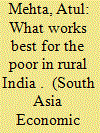

|
|
|
|
|
| Summary/Abstract |
Financial sector development serves poor directly through poverty-lending approach or financial systems approach. Robinson (2001) questions the appropriateness of poverty-lending approach for the extremely poor and supports the financial systems approach for providing a poverty alleviation toolbox to serve the poor at various levels. The present study attempts to assess the effectiveness of the two lending approaches and comments on the appropriateness of the same for the poor and the poorest of the poor in rural India using state-wise annual data from 1999–2000 to 2011–2012. We conduct a panel data analysis for a sample of 15 major Indian states and provide an empirical evidence for the effect of various poverty alleviation tools on the poor and the poorest of the poor in rural India. The study partially supports the use of tools suggested by Robinson.
|
|
|
|
|
|
|
|
|
|
|
|
|
|
|
|
| 14 |
ID:
104032
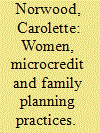

|
|
|
|
|
| Publication |
2011.
|
| Summary/Abstract |
This paper examines the influence of informal banking club participation on family planning practices in rural Ghana. Research from Asia suggests that family planning practices are improved by club participation. This study examines this thesis in an African context, using rural Ghana as a case study. A sample of 204 women (19 years and older) was drawn from Abokobi village, Ghana. Multivariate analyses of direct, mediating and moderating effects of women's demographic background characteristics, membership status and length, and women's empowerment status as predictors of family planning practices are assessed. Findings suggest that club membership and membership length is not associated with family planning practices; however, age, education level, number of children and empowerment status are.
|
|
|
|
|
|
|
|
|
|
|
|
|
|
|
|
|
|
|
|
|